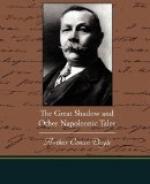During all this time the roaring of those guns had been something dreadful to listen to, but now they suddenly died away, though it was like the lull in a thunderstorm when one feels that a worse crash is coming hard at the fringe of it. There was still a mighty noise on the distant wing, where the Prussians were pushing their way onwards, but that was two miles away. The other batteries, both French and English, were silent, and the smoke cleared so that the armies could see a little of each other. It was a dreary sight along our ridge, for there seemed to be just a few scattered knots of red and the lines of green where the German Legion stood, while the masses of the French appeared to be as thick as ever, though of course we knew that they must have lost many thousands in these attacks. We heard a great cheering and shouting from among them, and then suddenly all their batteries opened together with a roar which made the din of the earlier part seem nothing in comparison. It might well be twice as loud, for every battery was twice as near, being moved right up to point blank range, with huge masses of horse between and behind them to guard them from attack.
When that devil’s roar burst upon our ears there was not a man, down to the drummer boys, who did not understand what it meant. It was Napoleon’s last great effort to crush us. There were but two more hours of light, and if we could hold our own for those all would be well. Starved and weary and spent, we prayed that we might have strength to load and stab and fire while one of us stood upon his feet.
His cannon could do us no great hurt now, for we were on our faces, and in an instant we could turn into a huddle of bayonets if his horse came down again. But behind the thunder of the guns there rose a sharper, shriller noise, whirring and rattling, the wildest, jauntiest, most stirring kind of sound.
“It’s the pas-de-charge!” cried an officer. “They mean business this time!”
And as he spoke we saw a strange thing. A Frenchman, dressed as an officer of hussars, came galloping towards us on a little bay horse. He was screeching “Vive le roi! Vive le roi!” at the pitch of his lungs, which was as much as to say that he was a deserter, since we were for the king and they for the emperor. As he passed us he roared out in English, “The Guard is coming! The Guard is coming!” and so vanished away to the rear like a leaf blown before a storm. At the same instant up there rode an aide-de-camp, with the reddest face that ever I saw upon mortal man.
“You must stop ’em, or we are done!” he cried to General Adams, so that all our company could hear him.
“How is it going?” asked the general.
“Two weak squadrons left out of six regiments of heavies,” said he, and began to laugh like a man whose nerves are overstrung.
“Perhaps you would care to join in our advance? Pray consider yourself quite one of us,” said the general, bowing and smiling as if he were asking him to a dish of tea.




